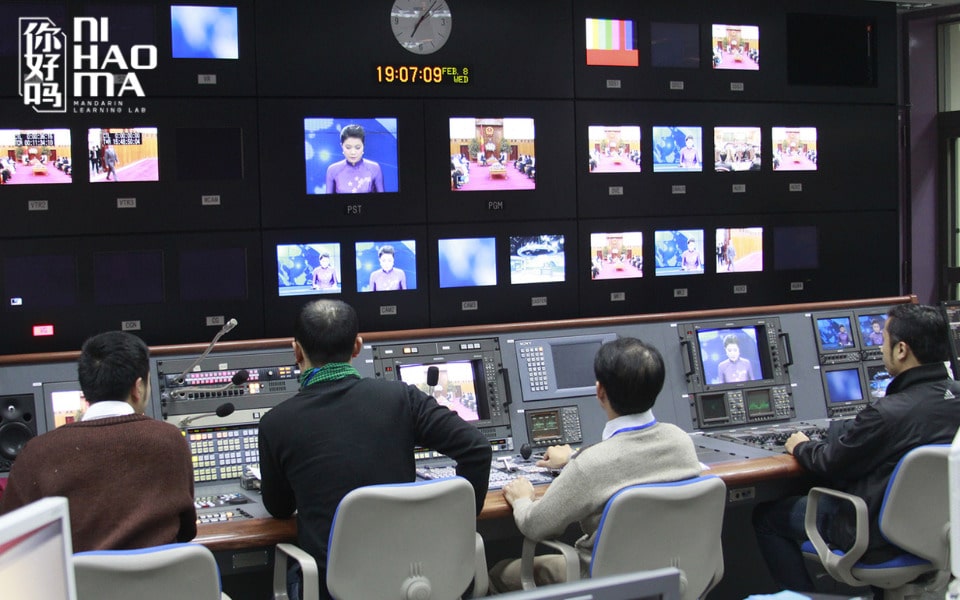For anyone learning Chinese or working in the media field, mastering a solid system of Chinese vocabulary for media and communications is key to more effective interaction. In this guide, Ni Hao Ma provides you with the most common industry terms, along with practical sample dialogues, to help you practice and retain communication patterns with ease.
What Does “Communications” Mean in Chinese?
In Chinese, communications is expressed as 传媒 (chuánméi) or 传播 (chuánbō).
- 传媒 (chuánméi) usually refers to mass media platforms such as newspapers, radio, television, the internet, and social media.
- 传播 (chuánbō) emphasizes the process of delivering information, knowledge, or ideas from one person to another.
That’s why in Chinese, “media and communication” can be understood both as an industry and as a process of exchanging information.
Chinese Vocabulary for Media and Communications
If you are learning Chinese and planning to pursue a career in this field, specialized vocabulary is an essential tool. To make learning easier, we’ve divided Chinese vocabulary for media and communications into key categories.
Chinese Vocabulary for Media Fields
The media and communication industry is broad, covering many areas such as journalism, broadcasting, television, advertising, public relations (PR), marketing, digital media, and social media.
| Chinese | Pinyin | Meaning |
|---|---|---|
| 新闻传播 | xīnwén chuánbō | Journalism and Communication |
| 出版 | chūbǎn | Publishing |
| 广播 | guǎngbò | Broadcasting |
| 电视传媒 | diànshì chuánméi | Television Media |
| 广告 | guǎnggào | Advertising |
| 公共关系 | gōnggòng guānxì | Public Relations (PR) |
| 市场营销 | shìchǎng yíngxiāo | Marketing |
| 数字传媒 | shùzì chuánméi | Digital Media |
| 新媒体 | xīn méitǐ | New Media |
| 自媒体 | zì méitǐ | Independent Media (KOL, Influencer) |
| 社交媒体 | shèjiāo méitǐ | Social Media |

Chinese Vocabulary for Media Professions
The media industry includes a wide variety of professions. Each role requires specific skills and contributes to the smooth operation of the entire communication system.
| Chinese | Pinyin | Meaning |
|---|---|---|
| 记者 | jìzhě | Journalist / Reporter |
| 编辑 | biānjí | Editor |
| 主编 | zhǔbiān | Editor-in-Chief |
| 新闻主播 | xīnwén zhǔbō | News Anchor |
| 播音员 | bōyīnyuán | Broadcaster |
| 主持人 | zhǔchírén | Host / MC |
| 摄影师 | shèyǐngshī | Photographer |
| 摄像师 | shèxiàngshī | Cameraman |
| 导演 | dǎoyǎn | Director |
| 编剧 | biānjù | Scriptwriter |
| 灯光师 | dēngguāng shī | Lighting Technician |
| 录音师 | lùyīn shī | Sound Engineer |
| 服装师 | fúzhuāngshī | Stylist |
| 道具师 | dàojùshī | Props Manager |
| 化妆师 | huàzhuāngshī | Makeup Artist |
| 媒体总监 | méitǐ zǒngjiān | Media Director |
| 美术指导 | měishù zhǐdǎo | Art Director |
| 剪辑师 | jiǎnjíshī | Video Editor |
| 文案 | wén’àn | Copywriter |
| 市场专员 | shìchǎng zhuānyuán | Marketing Specialist |
| 公关专员 | gōngguān zhuānyuán | PR Specialist |
| 媒体关系专员 | méitǐ guānxì zhuānyuán | Media Relations Officer |
| 网红 | wǎnghóng | Influencer |
| 主播 | zhǔbō | Streamer |
| 内容创作者 | nèiróng chuàngzuòzhě | Content Creator |
| 社交媒体经理 | shèjiāo méitǐ jīnglǐ | Social Media Manager |
| 危机公关专员 | wēijī gōngguān zhuānyuán | Crisis Communication Specialist |
| 活动策划 | huódòng cèhuà | Event Planner |
| 评论员 | pínglùnyuán | Commentator |
| 新闻分析师 | xīnwén fēnxīshī | News Analyst |
| 演说家 | yǎnjiǎng jiā | Public Speaker |
See more: 200+ Chinese Vocabulary for Jobs and Occupations (Beginner-Friendly Guide)
Chinese Vocabulary for Media Channels and Platforms
Media channels are the bridge that delivers information quickly and effectively from the source to the audience. Each channel—from print to broadcasting, television, or social media—serves different purposes and audiences.
| Chinese | Pinyin | Meaning |
|---|---|---|
| 媒体 | méitǐ | Media |
| 大众媒体 | dàzhòng méitǐ | Mass Media |
| 报纸 | bàozhǐ | Newspaper |
| 杂志 | zázhì | Magazine |
| 出版物 | chūbǎnwù | Publications |
| 广播 | guǎngbò | Radio Broadcasting |
| 电视 | diànshì | Television |
| 电影 | diànyǐng | Film / Cinema |
| 电台 | diàntái | Radio Station |
| 电视台 | diànshìtái | TV Station |
| 户外广告 | hùwài guǎnggào | Outdoor Advertising |
| 海报 | hǎibào | Poster |
| 宣传单 | xuānchuán dān | Flyer |
| 社交媒体 | shèjiāo méitǐ | Social Media |
| 微博 | wēibó | |
| 微信 | wēixìn | |
| 抖音 | dǒuyīn | Douyin (TikTok China) |
| 视频平台 | shìpín píngtái | Video Platform (YouTube, Bilibili…) |
| 电子邮件 | diànzǐ yóujiàn | |
| 短信 | duǎnxìn | SMS |
| 播客 | bōkè | Podcast |
| 新闻网站 | xīnwén wǎngzhàn | News Website |
| 门户网站 | ménhù wǎngzhàn | Portal Website |
| 搜索引擎 | sōusuǒ yǐnqíng | Search Engine (Google, Baidu…) |
| 论坛 | lùntán | Forum |
| 博客 | bókè | Blog |
| 电视广告 | diànshì guǎnggào | TV Commercial |
| 网络广告 | wǎngluò guǎnggào | Online Advertising |
| 社群平台 | shèqún píngtái | Community Platform |

Chinese Vocabulary for Media Activities
Media activities include all the tasks, processes, and practices that organizations or individuals use to deliver information, messages, or branding to the public. These activities can take place across multiple channels, from traditional media like print and broadcasting to digital media such as social networks and live events.
| Chinese | Pinyin | Meaning |
|---|---|---|
| 报道 | bàodào | Reporting / News Coverage |
| 采访 | cǎifǎng | Interview |
| 撰稿 | zhuàngǎo | Writing Articles / Drafting Content |
| 编辑 | biānjí | Editing |
| 发布新闻 | fābù xīnwén | Publishing News |
| 出版 | chūbǎn | Publishing |
| 播出 | bōchū | Broadcasting |
| 宣传 | xuānchuán | Promotion / Publicity |
| 广告 | guǎnggào | Advertising |
| 举办活动 | jǔbàn huódòng | Organizing Events |
| 举办发布会 | jǔbàn fābùhuì | Holding a Press Conference |
| 公关活动 | gōngguān huódòng | PR Activities |
| 危机处理 | wēijī chǔlǐ | Crisis Management |
| 建立品牌 | jiànlì pǐnpái | Building a Brand |
| 推广产品 | tuīguǎng chǎnpǐn | Promoting Products |
| 市场调研 | shìchǎng diàoyán | Market Research |
| 维护媒体关系 | wéihù méitǐ guānxì | Media Relations Management |
| 建立品牌形象 | jiànlì pǐnpái xíngxiàng | Building Brand Image |
| 管理社交账号 | guǎnlǐ shèjiāo zhànghào | Managing Social Accounts |
| 发布帖子 | fābù tiězi | Posting Content |
| 转发 | zhuǎnfā | Sharing / Reposting |
| 点赞 | diǎnzàn | Liking (Posts) |
| 评论 | pínglùn | Commenting |
| 拍摄 | pāishè | Filming / Photography |
| 剪辑视频 | jiǎnjí shìpín | Video Editing |
| 配音 | pèiyīn | Voice-over / Dubbing |
| 做调查 | zuò diàochá | Conducting Surveys |
| 举办展览 | jǔbàn zhǎnlǎn | Organizing Exhibitions |
| 参加论坛 | cānjiā lùntán | Attending Forums / Seminars |
| 在线直播 | zàixiàn zhíbò | Livestreaming |
Dialogues Using Chinese Vocabulary for Media and Communications
To master specialized vocabulary, practicing through real-life dialogues is one of the most effective methods. By working with familiar situations in journalism, advertising, public relations, or digital media, learners not only expand their vocabulary but also gain a deeper understanding of how words are used in context. Let’s take a look at some sample dialogues that incorporate Chinese vocabulary for media and communications.
Dialogue 1: Crisis Communication Management
A: 我们公司遇到了一些负面新闻。
Wǒmen gōngsī yùdào le yīxiē fùmiàn xīnwén.
Our company has encountered some negative news.
B: 我们需要立即发布官方声明,控制舆论。
Wǒmen xūyào lìjí fābù guānfāng shēngmíng, kòngzhì yúlùn.
We need to immediately release an official statement to control public opinion.
A: 同时要联系主要媒体,争取正面报道。
Tóngshí yào liánxì zhǔyào méitǐ, zhēngqǔ zhèngmiàn bàodào.
At the same time, we should contact major media outlets to secure positive coverage.
B: 好的,我会安排媒体关系团队去执行。
Hǎo de, wǒ huì ānpái méitǐ guānxì tuánduì qù zhíxíng.
Okay, I’ll arrange for the media relations team to handle it.

Dialogue 2: Planning a Media Event
A: 今天我们开会讨论下个月的品牌发布会。
Jīntiān wǒmen kāihuì tǎolùn xià gè yuè de pǐnpái fābùhuì.
Today we’re meeting to discuss next month’s brand launch event.
B: 我建议邀请一些明星嘉宾,提高活动影响力。
Wǒ jiànyì yāoqǐng yīxiē míngxīng jiābīn, tígāo huódòng yǐngxiǎnglì.
I suggest inviting some celebrity guests to increase the event’s impact.
A: 我们还需要通过微博和抖音提前宣传。
Wǒmen hái xūyào tōngguò Wēibó hé Dǒuyīn tíqián xuānchuán.
We also need to promote it in advance through Weibo and Douyin.
B: 我会负责舞台设计和宣传海报。
Wǒ huì fùzé wǔtái shèjì hé xuānchuán hǎibào.
I’ll take care of stage design and promotional posters.
A: 很好,我们分工合作,确保活动顺利进行。
Hěn hǎo, wǒmen fēngōng hézuò, quèbǎo huódòng shùnlì jìnxíng.
Great. Let’s divide the tasks and work together to ensure the event runs smoothly.
Conclusion
Vocabulary only becomes truly valuable when applied in real-life situations. That’s why, in addition to memorizing words, you should practice through dialogues and real-world scenarios. This not only helps you retain vocabulary longer but also strengthens your ability to respond quickly and naturally. We hope these examples of Chinese vocabulary for media and communications compiled by Ni Hao Ma have given you useful insights—stay tuned for more exciting content!



